Aromatherapy is a popular practice in spas, utilizing the inhalation or topical application of essential oils to enhance physical and emotional well-being. These natural plant extracts are often used to create a relaxing and soothing environment for spa-goers. However, there is growing concern about the potential health risks associated with aromatherapy, particularly in relation to bronchial and sinus problems. This article aims to explore the use of aromatherapy in spa settings and its possible effects on respiratory health.
Aromatherapy has been used for centuries as a holistic healing treatment, offering a range of benefits for both the body and mind. Essential oils are carefully selected and blended to create custom scents that can promote relaxation, reduce stress, alleviate muscle tension, improve sleep quality, and even boost mood. Many people seek out aromatherapy at spas as a way to enhance their overall spa experience and achieve a greater sense of well-being.
However, despite its widespread popularity, there are concerns regarding the safety of aromatherapy, especially when it comes to its potential impact on respiratory health. Some experts suggest that certain essential oils may irritate the airways and trigger bronchial or sinus problems in certain individuals. It is important for spa-goers to understand the potential risks associated with aromatherapy and how they can ensure safe usage when enjoying these treatments at their favorite spas.
The Benefits of Aromatherapy in Spa
Aromatherapy has been a popular practice in spas for its various benefits, including relaxation, stress relief, and improved mood. The use of essential oils and aromatic compounds in aromatherapy can promote overall well-being and enhance the spa experience for many individuals. These essential oils are often combined with massage therapy or used in diffusers to create a calming and soothing environment.
Research has shown that certain essential oils used in aromatherapy have antibacterial, antiviral, and anti-inflammatory properties, making them beneficial for reducing stress, promoting better sleep, and relieving muscle tension. For example, lavender oil has been found to have sedative effects, while peppermint oil is known for its ability to alleviate headaches. Additionally, essential oils such as eucalyptus and tea tree oil have been used to clear congestion and improve respiratory health.
Despite the numerous benefits of aromatherapy in spa settings, it is important to be aware of potential risks associated with this practice. Some individuals may be sensitive or allergic to certain essential oils, which can lead to adverse reactions such as skin irritation or respiratory problems if not used properly. It is crucial for spa-goers to communicate any allergies or sensitivities to their massage therapists or spa professionals before undergoing aromatherapy treatments.
| Aromatherapy Benefits | Examples |
|---|---|
| Promotes relaxation and stress relief | Lavender oil |
| Improves mood | Bergamot oil |
| Relieves muscle tension | Chamomile oil |
The Potential Risks of Aromatherapy in Spa
Aromatherapy has become a popular relaxation and wellness technique in the spa industry, with many people seeking out the benefits of using essential oils for their therapeutic properties. However, it is important to understand that there are potential risks associated with aromatherapy when used in a spa setting. While aromatherapy can offer various benefits, it is essential to be aware of the potential risks and take appropriate precautions.
One of the potential risks of aromatherapy in a spa setting is the possibility of causing bronchial problems. Inhalation of concentrated essential oils can irritate the respiratory system, leading to symptoms such as coughing, shortness of breath, and chest tightness. Some individuals may be more sensitive to certain essential oils than others, making them more susceptible to developing bronchial issues after exposure to these oils in a spa environment.
In addition to bronchial problems, there is also a concern that aromatherapy used in a spa setting can potentially cause sinus problems The inhalation of certain essential oils can irritate the nasal passages and sinuses, leading to congestion, headaches, and sinus pressure. This risk is particularly relevant for individuals who already suffer from sinus-related issues or are prone to allergies.
It is crucial for spa-goers and practitioners alike to take measures to safely use aromatherapy in a spa setting. Understanding proper dilution ratios for essential oil usage, ensuring adequate ventilation in treatment rooms, and being mindful of clients’ sensitivities and pre-existing health conditions are all important factors in minimizing the potential risks associated with aromatherapy in a spa environment.
| Potential Risks | Effects |
|---|---|
| Bronchial Problems | Coughing, shortness of breath, chest tightness |
| Sinus Problems | Congestion, headaches, sinus pressure |
Can Aromatherapy in Spa Cause Bronchial Problems?
Aromatherapy is a popular practice in spas and wellness centers, using essential oils to promote relaxation, reduce stress, and alleviate various physical ailments. While many people swear by the benefits of aromatherapy, there are also potential risks and concerns that need to be addressed. One common question that arises is whether aromatherapy used in spa can cause bronchial problems.
There have been cases where individuals experienced respiratory issues after being exposed to certain essential oils in a spa setting. It’s important to understand that some essential oils can be irritating to the respiratory system, especially for individuals with preexisting conditions such as asthma or chronic bronchitis. Inhaling certain essential oils directly or through diffusion in a spa environment can potentially trigger bronchial problems for these individuals.
To help you make informed choices about using aromatherapy in spa without causing bronchial problems, here are some important considerations to keep in mind:
1. Choose your essential oils wisely: Opt for gentle, non-irritating essential oils such as lavender, chamomile, or eucalyptus.
2. Ensure proper ventilation: Make sure the spa room is well ventilated to prevent the accumulation of potent essential oil vapors.
3. Consult with a professional: If you have any concerns about using aromatherapy in a spa setting due to bronchial issues, consult with a qualified aromatherapist or healthcare provider before trying any treatments.
By taking these precautions, you can safely enjoy the benefits of aromatherapy in a spa without risking any negative effects on your bronchial health.
Can Aromatherapy in Spa Cause Sinus Problems?
Aromatherapy is a popular practice in spas, offering a range of benefits for relaxation and wellness. However, it is important to consider the potential risks associated with aromatherapy, including its impact on sinus health. This section will explore the relationship between aromatherapy in spa and sinus problems, as well as provide guidance on safe usage and alternative options.
Potential Risks of Aromatherapy for Sinus Health
While aromatherapy
Safely Using Aromatherapy for Sinus Health
To minimize the risk of sinus problems caused by aromatherapy in spa settings, it is essential to select mild and soothing essential oils that are less likely to trigger irritation. Lavender, eucalyptus, peppermint, and chamomile are examples of essential oils that are generally considered safe for sinus health. Furthermore, maintaining proper ventilation in spa areas where aromatherapy is being used can help prevent an overwhelming concentration of scents that may affect sinus health.
Alternative Aromatherapy Options for Sinus Health
For individuals who have pre-existing sinus conditions or are concerned about potential irritants from traditional aromatherapy in spa settings, there are alternative options available. Nasal inhalers or diffusers can be used to enjoy milder concentrations of essential oils specifically chosen to support sinus health without exposing individuals to strong scents that could potentially cause discomfort or irritation. It is advisable for those with known sinus issues to consult with a healthcare professional before incorporating aromatherapy into their spa experience.
How to Safely Use Aromatherapy in Spa
Aromatherapy is a popular practice in spa settings, using essential oils to enhance relaxation and promote overall well-being. However, it is important to understand how to use aromatherapy safely to avoid potential risks such as bronchial or sinus problems.
Understanding Proper Dilution
One of the most important aspects of safely using aromatherapy in a spa setting is understanding the proper dilution of essential oils. Essential oils are highly concentrated and can be irritating if used at full strength. It is essential to dilute essential oils with a carrier oil before applying them to the skin or using them in a diffuser.
Proper Ventilation
In a spa setting, proper ventilation is crucial when using aromatherapy. Prolonged exposure to strong scents in a confined space can potentially irritate the respiratory system, leading to bronchial or sinus problems. Ensuring that there is adequate ventilation when using aromatherapy can help minimize any potential risks.
Choosing Safe Essential Oils
Not all essential oils are suitable for everyone, and some may be more likely to cause respiratory irritation than others. When using aromatherapy in a spa, it is important to choose safe essential oils that are less likely to cause bronchial or sinus problems. Consulting with a certified aromatherapist or healthcare professional can help you make informed choices about which essential oils are best for your individual needs.
By following these guidelines for safely using aromatherapy in a spa setting, individuals can enjoy the benefits of this practice without risking potential bronchial or sinus problems. It’s important to be mindful of proper dilution, ventilation, and the selection of safe essential oils when incorporating aromatherapy into spa treatments.
Alternative Aromatherapy Options for Bronchial or Sinus Health
While aromatherapy is a popular choice for relaxation and wellness in spa settings, it is important to consider alternative options for maintaining bronchial or sinus health. For individuals who are sensitive to certain essential oils or fragrances, traditional aromatherapy may exacerbate respiratory issues, leading to discomfort and potential health risks. Fortunately, there are alternative aromatherapy options that can still provide therapeutic benefits without the risk of causing bronchial or sinus problems.
1. Inhalation of steam: Steam inhalation with the use of natural ingredients such as eucalyptus leaves or mint can help alleviate sinus congestion and bronchial issues. This method helps open up the airways and promote easier breathing without the need for essential oils that may trigger respiratory discomfort.
2. Saline nasal sprays: Saline nasal sprays provide a gentle and natural way to moisturize the nasal passages and alleviate sinus congestion. They are particularly helpful for individuals dealing with sinus problems without the added risk of exposure to potentially irritant essential oils.
3. Herbal teas: Certain herbal teas such as peppermint or chamomile have natural anti-inflammatory properties that can help soothe bronchial irritation and promote respiratory wellness. Sipping on these teas can provide a gentle alternative for individuals seeking relief from bronchial discomfort without the use of aromatic oils.
By considering these alternative aromatherapy options, individuals can still enjoy the benefits of holistic wellness while minimizing the potential risk of exacerbating bronchial or sinus problems that may arise from traditional aromatherapy methods in spa settings. It is vital to prioritize respiratory health when seeking relaxation and therapeutic treatments, and these alternatives offer safe and effective ways to support bronchial or sinus wellness without compromising comfort or well-being.
Conclusion
In conclusion, it is important for spa-goers to be well-informed about the potential risks and benefits of aromatherapy in spa settings. While there are numerous benefits to using essential oils and aromatherapy in a spa environment, there are also potential risks that should not be overlooked. Individuals with bronchial or sinus problems should exercise caution when considering aromatherapy treatments in the spa, as certain oils and methods of inhalation can exacerbate these conditions.
It is crucial for individuals to communicate any respiratory issues or concerns with their spa therapist before undergoing any aromatherapy treatments. This will allow the therapist to make informed recommendations and utilize alternative options that will not pose a risk to the individual’s bronchial or sinus health.
Additionally, individuals should take measures to research and understand the specific essential oils being used in their chosen spa treatment, as some oils may be more irritating or harmful for those with respiratory issues.
Overall, making informed choices about aromatherapy in the spa means being proactive about understanding the potential risks while still benefiting from its therapeutic effects. By considering alternative options and openly communicating with spa therapists, individuals can still enjoy the relaxing and healing properties of aromatherapy without putting their bronchial or sinus health at risk. It is ultimately about finding a balance between reaping the benefits of aromatherapy and ensuring one’s overall well-being.
Frequently Asked Questions
Can Essential Oils Cause Sinus Problems?
Yes, essential oils can cause sinus problems for some individuals. This can happen when the strong scent of certain essential oils triggers allergic reactions or irritates the sinus passages, leading to congestion and discomfort.
Can Essential Oils Cause Respiratory Problems?
Essential oils have the potential to cause respiratory problems in some people, especially if they are used improperly or if a person has a pre-existing respiratory condition. Inhaling certain essential oils directly from the bottle or using them in high concentrations can lead to breathing issues.
What Are the Bad Side Effects of Aromatherapy?
Some of the bad side effects of aromatherapy include skin irritation or allergic reactions when using essential oils topically. Ingesting essential oils can also be toxic and harmful. Additionally, overexposure to strong scents from aromatherapy can trigger headaches or migraines in sensitive individuals.

Are you looking for a natural way to improve your health and wellbeing?
If so, aromatherapy may be the answer for you.



